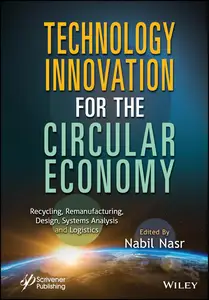Technology Innovation for the Circular Economy Recycling, Remanufacturing, Design, System Analysis and Logistics

Free Download Technology Innovation for the Circular Economy: Recycling, Remanufacturing, Design, System Analysis and Logistics by Nabil Nasr
English | February 21, 2024 | ISBN: 139421426X | 816 pages | MOBI | 22 Mb
TECHNOLOGY INNOVATION FOR THE CIRCULAR ECONOMY
The book comprises 56 peer-reviewed chapters comprehensively covering in-depth areas of circular economy design, planning, business models, and enabling technologies.
Some of the greatest opportunities for innovation in the circular economy are in remanufacturing, refurbishment, reuse, and recycling. Critical to its growth, however, are developments in product design approaches and the manufacturing business model that are often met with challenges in the current, largely linear economies of today’s global manufacturing chains.
The conference hosted by the REMADE Institute in Rochester, NY, brought together U.S. and international researchers, industry engineers, technologists, and policymakers, to discuss the myriad intertwining issues relating to the circular economy.
This book consists of 56 chapters in 10 distinct parts covering broad areas of research and applications in the circular economy area. The first four parts explore the system level work related to circular economy approaches, models and advancements including the use of artificial intelligence (AI) and machine learning to guide implementation, as well as design for circularity approaches. Mechanical and chemical recycling technologies follow, highlighting some of the most advanced research in those areas. Next, innovation in remanufacturing is addressed with descriptions of some of the most advanced work in this field. This is followed by tire remanufacturing and recycling, highlighting innovative technologies in addressing the volume of end-of-use tires. Pathways to net-zero emissions in manufacturing of materials concludes the book, with a focus on industrial decarbonization.
Audience
This book has a wide audience in academic institutes, business professionals and engineers in a variety of manufacturing industries. It will also appeal to economists and policymakers working on the circular economy, clean tech investors, industrial decision-makers, and environmental professionals.
